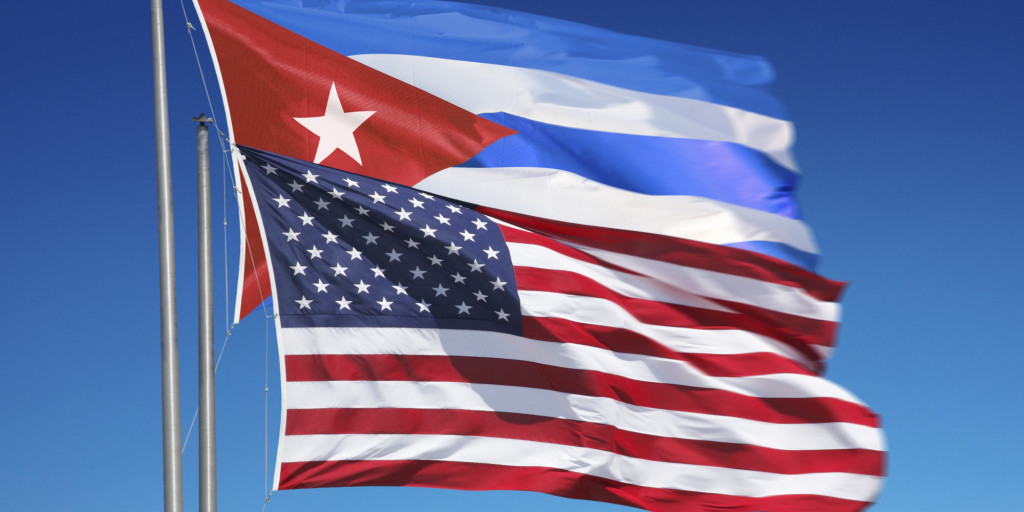
Support for re-establishing Cuba ties continues to grow
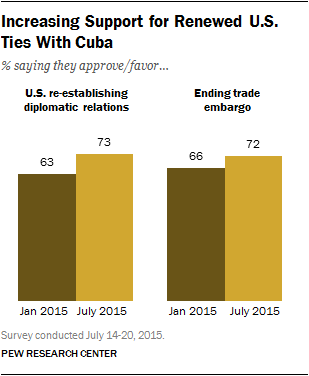 As the United States and Cuba moved this week to end more than 50 years of diplomatic conflict, public support for re-establishing relations with Cuba has increased. There is equally broad, and growing, support for ending the U.S. trade embargo against Cuba. In addition, a separate survey released today finds that the publics of several Latin American nations also view renewed U.S.-Cuba relations favorably.
As the United States and Cuba moved this week to end more than 50 years of diplomatic conflict, public support for re-establishing relations with Cuba has increased. There is equally broad, and growing, support for ending the U.S. trade embargo against Cuba. In addition, a separate survey released today finds that the publics of several Latin American nations also view renewed U.S.-Cuba relations favorably.
Nearly three-quarters (73%) of Americans say they approve of the U.S. re-establishing diplomatic relations with Cuba, up 10 points since January. A similar majority (72%) favors the U.S. ending its trade embargo against Cuba, “which would allow U.S. companies to do business in Cuba and Cuban companies to do business in the U.S.”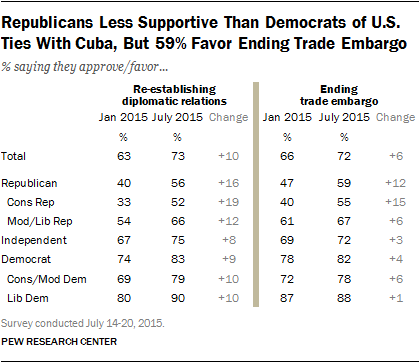
The share saying a thaw in U.S.-Cuba relations will lead to increased democracy in Cuba also has risen, though fewer than half (43%) say they expect Cuba to become more democratic over the next several years. Still, in January just 32% predicted that Cuba would become more democratic.
The latest Pew Research Center survey, conducted July 14-20, 2015 among 2,002 adults, finds that support for renewed U.S. diplomatic relations with Cuba has increased across nearly all partisan groups since January. Currently, 56% of Republicans say they approve of the U.S. re-establishing diplomatic relations with Cuba, up 16 percentage points since January. Larger majorities of Democrats (83%) and independents (75%) favor renewed diplomatic relations with Cuba, up nine and eight percentage points, respectively, since then.
There has been a similar shift across party lines in support for ending the U.S. trade embargo against Cuba. Notably, some of the most dramatic change in views of U.S. relations with Cuba has come among conservative Republicans.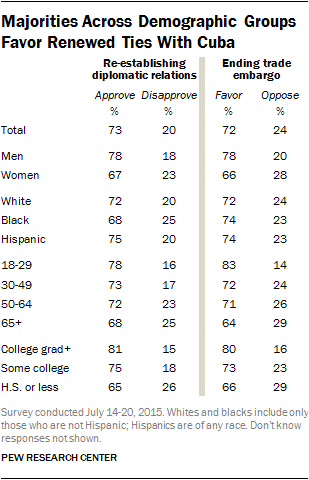
Currently, 55% of conservative Republicans say they favor ending the U.S. trade embargo against Cuba; in January, just 40% supported the United States dropping its trade embargo against Cuba. And 52% of conservative Republicans now say they approve of the U.S. re-establishing diplomatic relations with Cuba, up 19 points since January.
Support for restoring diplomatic ties with Cuba, and ending the embargo, spans virtually all groups in the population. And since January, increasing shares across most demographic groups favor both of these actions.
Overall, the public remains skeptical about the prospects of Cuba shifting in a democratic direction but more (43%) say they think the communist country will become more democratic over the next several years than did so in January (32%). About half (49%) say they expect Cuba to stay about the same as it is now.
Among Democrats, there is increasing optimism that Cuba will become more democratic over the next several years: 51% of Democrats say this now, compared with just 41% in January. Republicans are also slightly more likely to predict that Cuba will become more democratic; still, just a third (33%) express this view.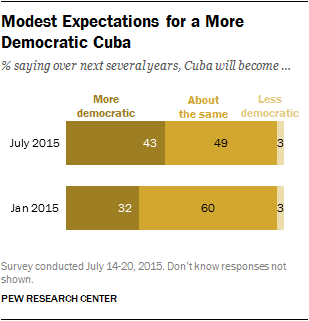
Nearly six-in-ten liberal Democrats (58%) say that Cuba will become more democratic over the next several years, compared with just 29% of conservative Republicans who say the same.
59% of Republicans Now Favor Scrapping the Embargo
About the Survey
The analysis in this report is based on telephone interviews conducted July 14-20, 2015 among a national sample of 2,002 adults, 18 years of age or older, living in all 50 U.S. states and the District of Columbia (700 respondents were interviewed on a landline telephone, and 1,302 were interviewed on a cell phone, including 758 who had no landline telephone). The survey was conducted by interviewers at Princeton Data Source under the direction of Princeton Survey Research Associates International. A combination of landline and cell phone random digit dial samples were used; both samples were provided by Survey Sampling International. Interviews were conducted in English and Spanish. Respondents in the landline sample were selected by randomly asking for the youngest adult male or female who is now at home. Interviews in the cell sample were conducted with the person who answered the phone, if that person was an adult 18 years of age or older. For detailed information about our survey methodology, see http://www.pewresearch.org/methodology/u-s-survey-research/
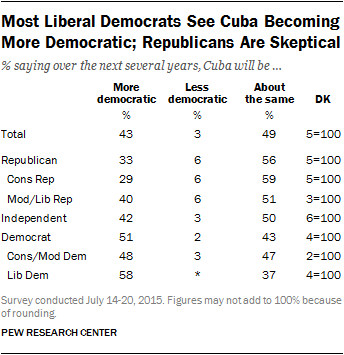 The combined landline and cell phone sample are weighted using an iterative technique that matches gender, age, education, race, Hispanic origin and nativity and region to parameters from the 2013 Census Bureau’s American Community Survey and population density to parameters from the Decennial Census. The sample also is weighted to match current patterns of telephone status (landline only, cell phone only, or both landline and cell phone), based on extrapolations from the 2014 National Health Interview Survey. The weighting procedure also accounts for the fact that respondents with both landline and cell phones have a greater probability of being included in the combined sample and adjusts for household size among respondents with a landline phone. The margins of error reported and statistical tests of significance are adjusted to account for the survey’s design effect, a measure of how much efficiency is lost from the weighting procedures.
The combined landline and cell phone sample are weighted using an iterative technique that matches gender, age, education, race, Hispanic origin and nativity and region to parameters from the 2013 Census Bureau’s American Community Survey and population density to parameters from the Decennial Census. The sample also is weighted to match current patterns of telephone status (landline only, cell phone only, or both landline and cell phone), based on extrapolations from the 2014 National Health Interview Survey. The weighting procedure also accounts for the fact that respondents with both landline and cell phones have a greater probability of being included in the combined sample and adjusts for household size among respondents with a landline phone. The margins of error reported and statistical tests of significance are adjusted to account for the survey’s design effect, a measure of how much efficiency is lost from the weighting procedures.
The following table shows the unweighted sample sizes and the error attributable to sampling that would be expected at the 95% level of confidence for different groups in the survey:
Sample sizes and sampling errors for other subgroups are available upon request.
In addition to sampling error, one should bear in mind that question wording and practical difficulties in conducting surveys can introduce error or bias into the findings of opinion polls.
Pew Research Center is a nonprofit, tax-exempt 501(c)(3) organization and a subsidiary of The Pew Charitable Trusts, its primary funder.



